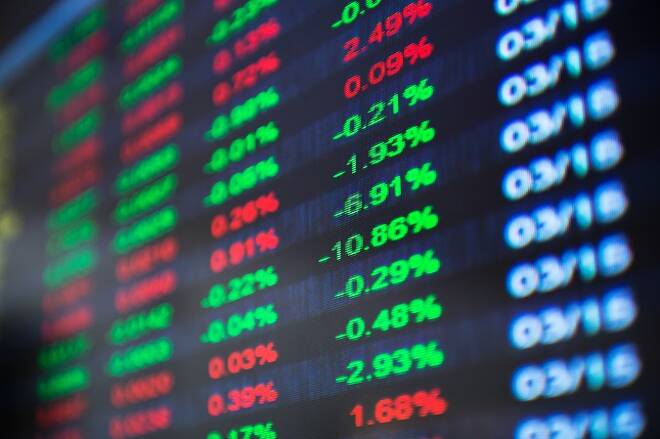Advertisement
Advertisement
Brexit and Trade Chatter to Keep GBP and USD in Focus
By:
Geo-political risk will remain the key driver ahead of the weekend, with Brexit and the possibility of a reduction in tariffs on Chinese goods on the table.
Earlier in the Day:
Economic data released through the Asian session this morning was on the lighter side, with stats limited to December PMI numbers out of New Zealand and December inflation numbers out of Japan. Later in the session, finalized industrial production numbers for November are due out of Japan that will unlikely have a bearing on the Yen.
For the Kiwi Dollar, the Business PMI rose from 53.5 to 55.1 in December, to hit the highest level of overall activity since April 2018.
- The PMI averaged 53.8, slightly ahead of the long-run average of 53.4, whilst well below 56.2 for 2017 and 56.0 for 2016.
Looking at the sub-indexes:
- The production sub-index rose from 51.9 to 55.7, with the finished stocks sub-index rising from 55.3 to 58.6.
- The Employment sub-index rose from 51.2 to 52.2, with the deliveries sub-index rising from 53.0 to 58.5.
The Kiwi Dollar moved from $0.67617 to $0.67697 upon release of the figures, before easing to $0.6769 at the time of writing, down 0.09% for the session.
For the Japanese Yen, the annual rate of core inflation came in at 0.70% for December, which was worse than a forecasted 0.8% and down on November’s 0.9%.
- Dragging on core inflation in December was a fall in prices for housing (-0.1%) and transportation & communication (-0.1%).
- Prices for fuel, light and water charges continued to provide support, up 5% year-on-year, with prices for medical care up 1.3%.
- Prices for culture and recreation came in at 0.9%, which was a touch softer than 1% back in November.
- Prices for goods fell by 0.6%, a material shift from a 1.4% rise year-on-year in November, with prices for services stalling, after having risen by 0.3% in November.
The Japanese Yen moved from ¥109.128 to ¥109.097 against the Dollar, upon release of the figures, before falling to ¥109.29 at the time of writing, down 0.03% for the session.
Elsewhere, the Aussie Dollar stood at $0.7201, up 0.11% for the session, with risk appetite being supported by hopes that the U.S administration begins dialing back tariffs in an attempt to draw China into making larger concessions on trade.
The Day Ahead:
For the EUR, there are no material economic stats scheduled for release through the afternoon, leaving the EUR in the hands of market risk appetite and sentiment towards the global economy, disappointing earnings figures out of the U.S being overshadowed by trade chatter as the week comes to an end.
Trade tariff chatter could be a negative factor for the EUR through the day should Trump threaten Brussels with tariffs on autos, the Eurozone economy in no position to absorb the impact of tariffs on already waning demand.
At the time of writing, the EUR was up 0.06% to $1.1396.
For the Pound, economic data scheduled for release through the session includes December core retail sales figures.
While we can expect the numbers to provide immediate direction for the Pound, focus will remain on Brexit and any updates on talks between Britain and the EU.
While Brussels may lack the incentive to offer more favourable terms, in a hope of a new referendum that ends with Britain remaining within the EU, it could back fire should parliament vote any altered deal or even decide to agree to a ‘no deal’ scenario.
The EU needs Britain as a trading partner and a lack of a trade agreement would be as punitive to the EU as it would be Britain.
At the time of writing, the Pound was up 0.05% to $1.2992, with focus shifting away from Theresa May’s second great escape to Brussels.
Across the Pond, economic data is on the lighter side through the day, with key stats limited to December industrial production and prelim January consumer sentiment figures.
While we can expect influence on the Dollar, particularly the consumer sentiment figures, risk sentiment through the day and any trade chatter will also be a factor along with the extended government shutdown.
On the monetary policy front, FOMC member Williams is scheduled to speak, with any dovish commentary now expected from even the more bullish members, which should leave the Dollar largely unresponsive to any dovish chatter.
With the government shutdown heading for a 5th week, with no end in sight, the effects of the shutdown will begin to have a more significant impact on the U.S economy and quite likely the popularity of the U.S President.
At the time of writing, the Dollar Spot Index was down 0.02% to 96.044.
For the Loonie, after a quite week on the data front, economic data scheduled for release includes December inflation numbers.
Inflation would need to come in better than forecasted, with an uptick in the annual rate of inflation a consideration for the BoC, though it’s going to take more than an uptick in inflation to give the BoC a reason to get more hawkish.
Outside of the numbers, the IEA’s monthly report and impact on crude oil prices will also have an influence through the day.
The Loonie was up 0.08% to C$1.3269 against the U.S Dollar at the time of writing.
About the Author
Bob Masonauthor
With over 28 years of experience in the financial industry, Bob has worked with various global rating agencies and multinational banks. Currently he is covering currencies, commodities, alternative asset classes and global equities, focusing mostly on European and Asian markets.
Advertisement
